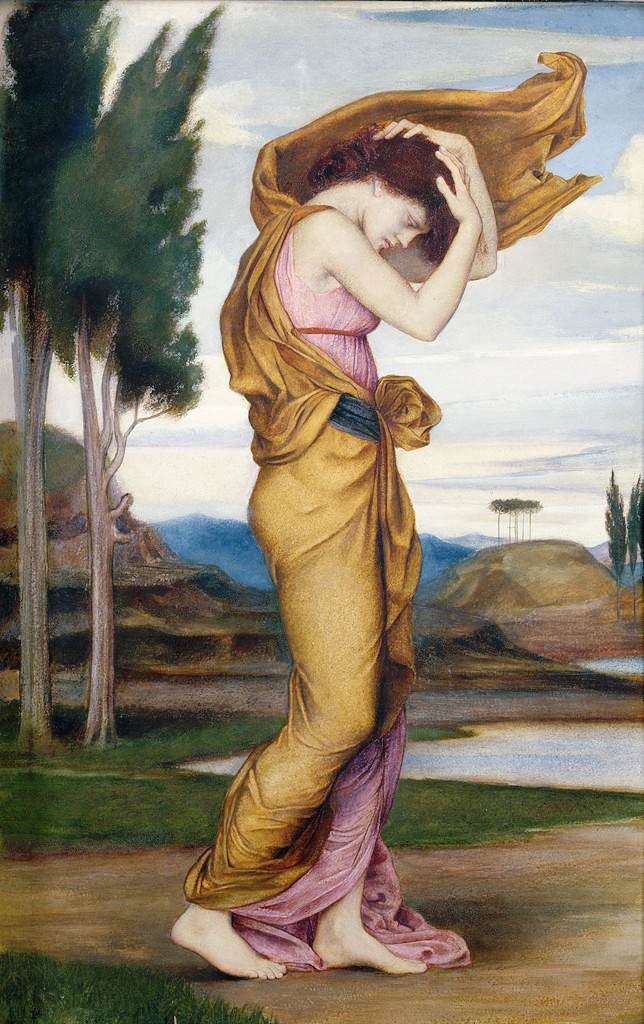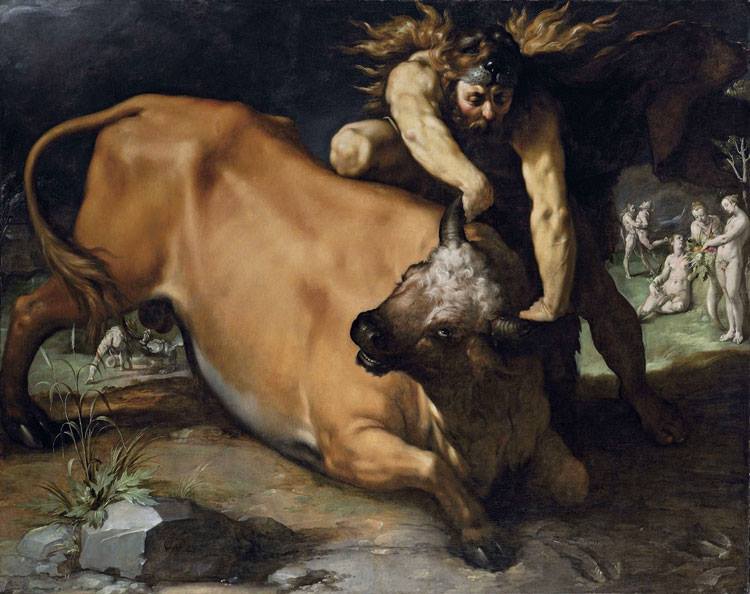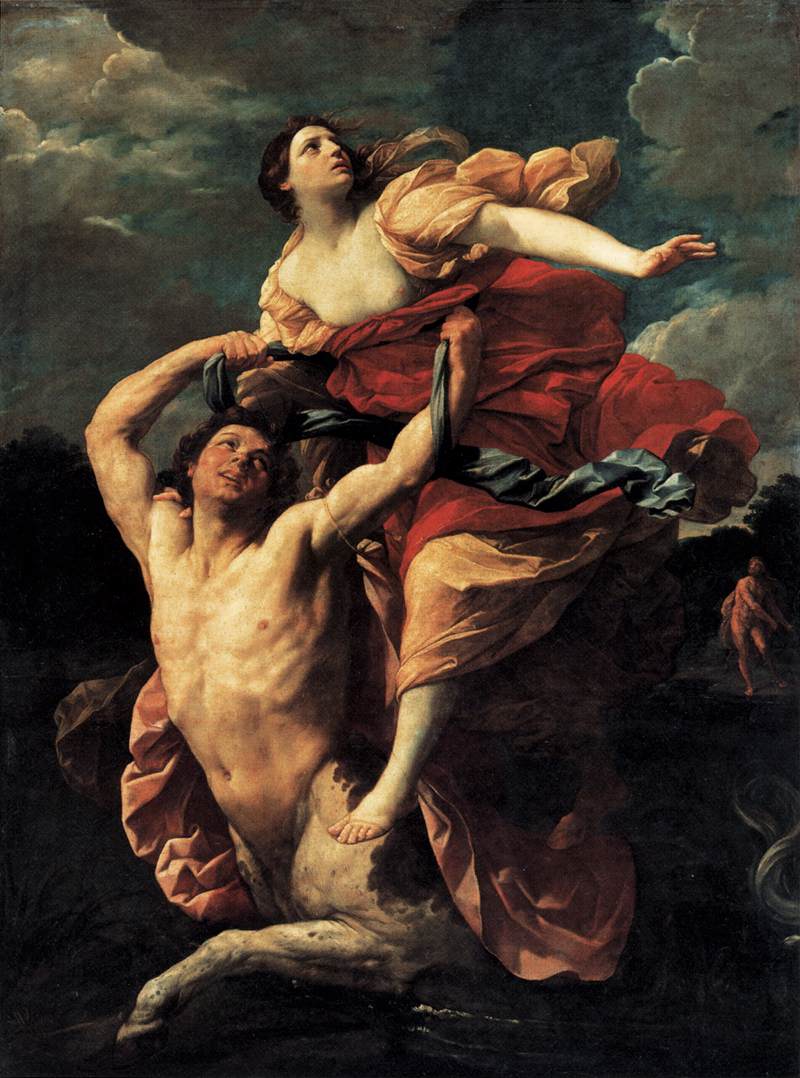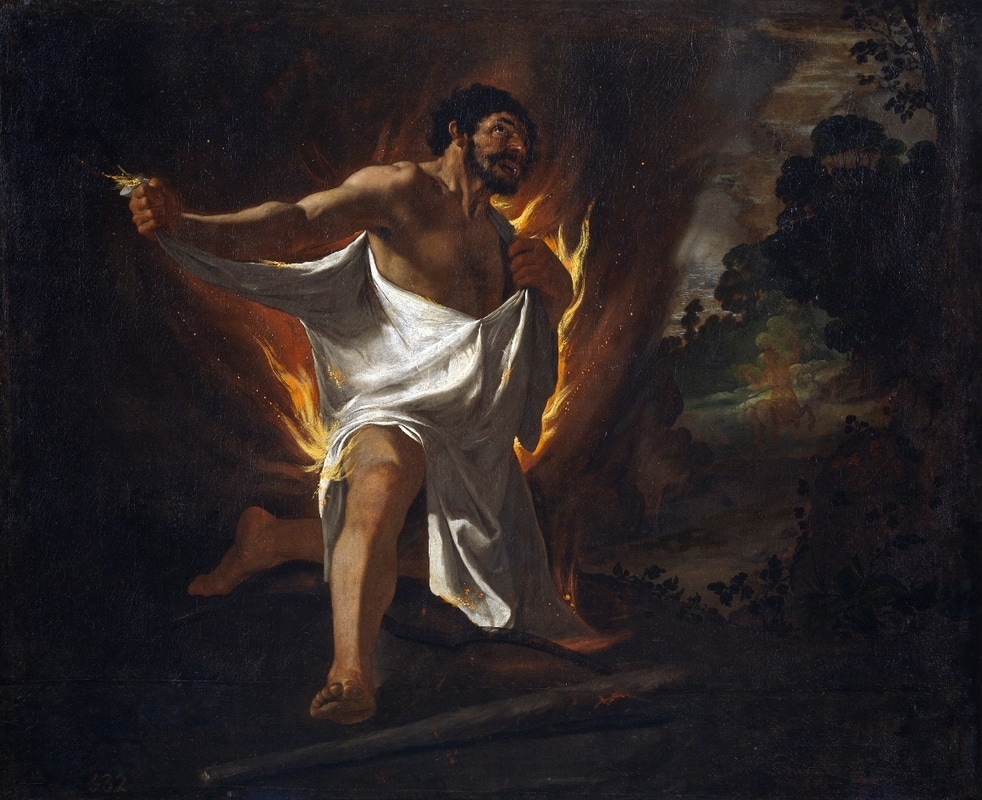DEIANIRA IN GREEK MYTHOLOGY
Deianira was a mortal princess in Greek mythology, and also a wife of the Greek hero Heracles. Famously, Deianira was also the cause of her husband’s death, doing something that gods, giants, monsters and men had all failed to achieve.
Deianira of calydon
|
Deianira is normally said to have been from the kingdom of Calydon born to Queen Althaea either by her husband, King Oeneus, or by the god Dionysus. If Dionysus is the father, it was said that Oeneus recognised that the god want to sleep with his wife, and deliberately made himself absent from the kingdom, so that it could happen.
As a daughter of Queen Althaea, Deianira was thus sister, or half-sister to the famous hero Meleager. |
Heracles Wrestles for Deianira
Heracles came to Calydon having been rebuffed in Oechelia, when the hero had believed he was to wed Iole, the daughter of King Eurytus.
Heracles forgot about Iole though when he saw the beautiful Deianira, and the hero sought to make the princess his third wife, after previously being married to Megara and Omphale.
Heracles though, was not the only one seeking the hand in marriage of Deianira, for the river god Achelous had also decided to marry the beautiful maiden.
To decide who would become the husband of Deianira, Achelous and Heracles would be forced to wrestle. Achelous was a strong and powerful river god, and additionally the Potamoi had the ability to change shape, but ultimately, Heracles won the wrestling bout, breaking off the horn of Achelous when the river god was in the form of a bull.
Thus Heracles had bested Achelous and won the hand of Deianira.
Heracles forgot about Iole though when he saw the beautiful Deianira, and the hero sought to make the princess his third wife, after previously being married to Megara and Omphale.
Heracles though, was not the only one seeking the hand in marriage of Deianira, for the river god Achelous had also decided to marry the beautiful maiden.
To decide who would become the husband of Deianira, Achelous and Heracles would be forced to wrestle. Achelous was a strong and powerful river god, and additionally the Potamoi had the ability to change shape, but ultimately, Heracles won the wrestling bout, breaking off the horn of Achelous when the river god was in the form of a bull.
Thus Heracles had bested Achelous and won the hand of Deianira.
Deianira and the Centaur Eurytion
Alternatively, Deianira was a daughter of King Dexamenus of Olenus, who Heracles seduced and slept with when he visited Olenus. Heracles promised to return and wed Deianira in the near future, but in the absence of Heracles, the centaur Eurytion came and demanded that Dexamenus give him his daughter’s hand in marriage. The frightened king had to agree to the demand.
Heracles would return to Olenus on the day that Eurytion and Deianira were to wed, but before the wedding could proceed, Heracles strangled Eurytion and so Deianira married Heracles instead.
Heracles would return to Olenus on the day that Eurytion and Deianira were to wed, but before the wedding could proceed, Heracles strangled Eurytion and so Deianira married Heracles instead.
Deianira and the Centaur NessusShortly after their marriage, Deianira and Heracles came to the banks of the River Evenus. There, the centaur Nessus, had set himself up as ferrymen, transporting travellers across the river upon his back for a small fee.
Deianira climbed aboard the centaur and safely crossed the river, but then Nessus decided that he wanted to have his way with Deianira, and the centaur started to run away with Deianira still on his back. A cry of fright from Deianira made Heracles aware of the plight of his wife, and in the briefest of moments, Heracles had taken up his bow and unleashed one of his poisoned arrows into the heart of the centaur. Heracles then sought to cross the river to get to his wife. |
Nessus was dying, for poison was wracking his body, but even so the centaur was plotting his revenge upon the man who had killed him. Nessus spoke to Deianira and told her if she made a potion from his blood, and used it on the clothes of her husband, then it would reinvigorate the love of Heracles for his wife, should it ever wane. Deianira, believing the words of the centaur, took the blood of the centaur and bottled it.
Deianira and the Death of Heracles
|
Years later it seemed to Deianira that the love of Heracles had waned for Heracles had taken himself a concubine in the form of Iole, the woman he had been promised years earlier.
Fearing that she would be abandoned, Deianira remembered the words of Nessus, and taking one of Heracles’ tunics, she emptied the bottle of the centaur’s blood onto it. The tunic was then presented to Heracles upon his return by his servant Lichas. |
|
Heracles put the tunic on, but as soon as it touched his skin, the poison of the Hydra started to rip at his flesh, for the blood of Nessus had been poisoned by the arrow of Heracles.
Recognising that he was dying, Heracles constructed his own funeral pyre, which was subsequently lit by Poeas or Philoctetes.
Having caused the death of her husband, Deianira was wracked by guilt, and so the wife of Heracles took her own life, either by falling upon a sword, or by hanging herself.
Recognising that he was dying, Heracles constructed his own funeral pyre, which was subsequently lit by Poeas or Philoctetes.
Having caused the death of her husband, Deianira was wracked by guilt, and so the wife of Heracles took her own life, either by falling upon a sword, or by hanging herself.
The Children of Deianira
Before her death, it was commonly said that Deianira had born Heracles five children; Hyllus, Onites (also known as Odites and Hodites), Ctesippus, Glenus and Macaria.
Hyllus is one of the most famous of the Heraclides, for it was often told that he was the one to kill King Eurystheus when the king brought his army to Athens. Macaria is also famous for events at the battle of Athens, for the daughter of Deianira and Heracles voluntarily killed herself to ensure victory for the Heraclides, just as the oracle had foretold.
Hyllus is one of the most famous of the Heraclides, for it was often told that he was the one to kill King Eurystheus when the king brought his army to Athens. Macaria is also famous for events at the battle of Athens, for the daughter of Deianira and Heracles voluntarily killed herself to ensure victory for the Heraclides, just as the oracle had foretold.
|
|



